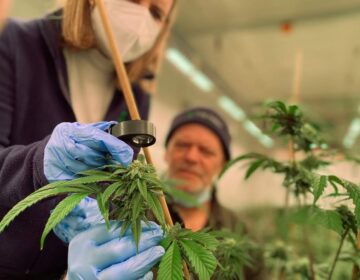Advocates and industry like what they see of New Jersey’s cannabis rules … so far
People are still reviewing the 160 pages of initial rules for New Jersey’s adult cannabis market. Advocates and those in the industry like what they’ve seen so far.

(Brennan Linsley, AP Photo)
Advocates and those in the cannabis industry are still going over the newly adopted rules for New Jersey’s recreational marijuana marketplace.
The rules were unanimously adopted Thursday by the state’s Cannabis Regulatory Commission, or CRC. So far, people like what they see.
“I think that the information that we heard was very positive,” said Shaya Brodchandel, president of the New Jersey Cannabis Trade Association. “Providing access and the equity part of it was all on point for us.”
Brodchandel is also CEO of Harmony Foundation of New Jersey, a medical marijuana dispensary in Seacaucus. With the new rules in place, he will be able to expand into the adult recreational marketplace. However, he will still need to maintain inventory for the patients his company serves with its medical license.
“If your medical license allows you to cultivate … for a thousand patients, you can’t grow for three thousand patients; [you can’t grow] one thousand [for] the medical market and two [thousand] … for an industry that’s about to come,” he explains.
The first set of rules makes important strides forward in terms of equity, said Ami Kachalia, campaign strategist for the ACLU of New Jersey. She specifically pointed to the prioritization of people she said were most harmed by marijuana prohibition.
“We urge the CRC to build on these steps to ensure a more inclusive and diverse cannabis industry by providing additional resources for equity applicants, including access to capital, and guiding municipal officials to center equity and inclusivity at the local level,” Kachalia said.
The commission adopted the rules four months after its first meeting and nearly a year after residents voted 2-to-1 in favor of legalizing recreational weed. In between, Gov. Phil Murphy signed three bills in February that decriminalized possession of six ounces or less and using marijuana on private property for people ages 21 and older. The application period for cannabis business licenses is still being determined.
The Rev. Charles Boyer, director of the group Salvation and Social Justice, said he was “pleasantly surprised” by how intentional the provisions addressing social justice were. The three categories of applications that receive priority are people who have lived in low-income areas or have past marijuana convictions; businesses owned by people of color, and; businesses that would be located in “Impact Zones” — cities or towns with large populations, high unemployment rates, or high numbers of marijuana crimes or arrests. The commission is expected to have that list soon.
Boyer credits people like Charles Barker, a former aide for U.S. Sen. Cory Booker who is a commission member, and Dianna Houenou, commission chairwoman who lead New Jersey United for Marijuana Reform, for bringing a social justice lens to the rules.
“These first set of regulations are far stronger than have been adopted in many of these other areas,” Boyer said, “which did not have commissioners of social equity folks quite as steeped in those kind of priorities as these.”
His biggest concern is the “kind of states rights approach” municipalities were given. Municipalities can still set a number of rules within its limits like hours of operation as well as weigh in on whether they support the businesses being operated.
“There’s hundreds of municipalities in New Jersey, and those municipalities exist because of racial inequity and concentrated poverty,” he said. “Even the way that the municipalities exist is rooted in structural racism.”
Boyer is also concerned about repeating what happened with harm reduction centers or needle exchanges, where they are concentrated mostly in urban centers. There are now six centers, after Atlantic City voted to force the one there to close in July.
“We know that there will be certain municipalities that will probably give green lights to cultivation, but not to retail, for instance,” he said. “They’ll want to benefit from the economics of cannabis, but will want to concentrate all of the face of cannabis into urban areas.”

Get daily updates from WHYY News!
WHYY is your source for fact-based, in-depth journalism and information. As a nonprofit organization, we rely on financial support from readers like you. Please give today.







